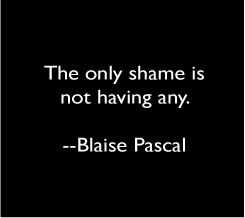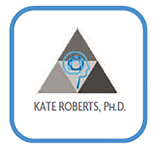 |
by Michael F. Mascolo, Ph.D.
We tend to have ambivalent feelings about shame. On the one hand, no one likes shame. Shame among the most painful emotions we can experience. We tend to think that shame is a harmful emotion. As a result, many parents try to protect their children from feelings of shame. Shame is painful that we even shy away from talking about it. On the other hand, shame is a moral emotion. Feelings of shame help shape the moral behavior of children and adults. Our desire to avoid the painful experience of shame is one of the many things that motivate us to try to be moral persons.
What is shame? Shame is often compared with guilt, its cousin emotion. Guilt is the awareness that we have performed a wrongdoing. In guilt, we feel as if we are carrying a heavy burden. In guilt, we are motivated to correct the wrongdoing. We can do this by confessing, apologizing, trying to fix the situation or by making reparations. Shame is different from guilt. In shame, we view ourselves from the eyes of others, and we realize that we bad, horrible or unworthy, and cannot be otherwise. In shame, we feel small, as if we are shrinking. In shame, we are motivated to hide ourselves from the view of others.
Guilt is about behavior – it’s about something that we did. In contrast, shame is about who we are. In guilt, I made a mistake; it shame, I am a mistake. I am unworthy, dishonorable or horrible in your eyes. Since, I am a bad person, there is little I can do to change the situation. As a result, I run and hide. In guilt, even though I did a bad thing, I’m not a bad person. I can change my plight by trying to fix the situation and asking for your forgiveness.
A person can feel guilt and/or shame about the same action. The difference is whether the person focuses on his immoral act or his unworthy self. For example, imagine that Todd broke into an elderly woman’s apartment and stole jewelry given to her by her late husband. Todd would feel guilty if he focused on the effects of act on the woman. He may be able to make amends by returning the jewelry or trying to making reparations of some sort. However, imagine that Todd is caught and his misdeed is reported in the newspapers. Todd will feel shame when he realizes that he is a horrible thief in the eyes of others and cannot be otherwise.
No wonder why shame is such a painful emotion; it does not simply call our behavior into question, it casts a shadow on who we are as persons. No wonder that we work so hard to protect our children from feeling shame! But wait – even though we are loathe to shame our children, would you want your child to be someone who feels no shame? Someone who is shameless?
Is it Possible to be a Good Person without Shame?
You might think, “What an odd question! What does shame have to do with being a good person?” The answer becomes clear when we think again about the difference between guilt and shame. In guilt, I did a bad thing; in shame, I am a bad person. Shame is the emotion that alerts us to our failure to live up to the ideals that define us as good, moral and worthy persons.
Some psychologists and sociologists call shame the “master emotion”. This is because in most social contexts, we are highly sensitive to how we appear to others as persons. It is not simply that we want others to like us or even to approve of us; we want to be able to see ourselves as worthy persons, both in our own eyes and in the eyes of others. When we fail to do so, we experience a variety of shame-related emotions: Shame, humiliation, disgrace, embarrassment, dishonor, loss of face, loss of self-esteem and so forth. The mere fact that we try so hard to avoid experiencing these emotions is evidence of their importance in our lives.
In this way, shame allows us to see ourselves through the eyes of others, and tells us that we are not being who we want to be. A shameful self is thus the opposite of a worthy self. The same standards that make us good persons when we live up to them make us bad persons when we fail to live up to them. And so, a good person cannot be shameless. Like it or not (probably not!), we cannot be good persons without some sense of the possibility of shame.
Don’t Be Shameless!
Shame can be a debilitating condition. This is because shame doesn’t give people an “out”. Either I’m horrible and I must hide my horrible self, or else I lash out in rage against those who I feel have shamed me. Either way, the outcome is not pretty. But we still must face the fact that, as uncomfortable as it may make us feel to say it, shame plays an important role in our moral lives. How can we use this ugly emotion constructively and avoid its debilitating effects?
The trick, of course, is to provide people with a constructive way out of shame. In our society, we tend to experience shame an indictment on our whole self. I am a horrible person in your eyes, and cannot be otherwise. Our sense of shame is based on the idea that we, as persons, are fixed things. If I am a fixed thing, and I do something shameful, then I am a horrible person and have no way out of shame.
However, what happens if we think of ourselves not as fixed things but as processes that are always under development? What would happen if we were to think of ourselves as works in progress rather than as fixed personalities? Imagine that instead of thinking of yourself as either “good” or “bad”, that you thought of yourself as always striving to become better?
This is the way “out” of shame. This is how to turn the situations involving feelings of shame into more constructive experiences. The key is not so much to protect children from feelings of shame, as it is to help them find a path out of shame. “I understand that you may feel ashamed of yourself for pushing your sister down. You should feel ashamed of yourself! This is not how good brothers act toward their sisters! A good brother takes care of his younger sister, even if she…”
The prevailing wisdom in world of parenting is that a child should never be made to feel bad about him or herself. But that simply cannot be so. There are situations in which we want our children to feel bad about themselves. We don’t want our children to be shameless! The trick is to realize that there are destructive and constructive experiences of shame. Shame is destructive when it offers us no escape. Shame can be constructive when we are shown the way out. When children fail to live up the standards that we set for who they ought to be, showing them how to achieve those standards can turn shame into virtue.
In the old days, grandma might have said to us “shame on you!” But by saying this, she certainly didn’t mean, “You are a horrible and unworthy person!” What she meant was more like, “right now, you are acting like a bad person, but if you change your behavior you can become a good person”. Grandma was giving us an “out”. She was not so much saying “Your are a disgrace and cannot be otherwise” as much as she was saying, “Don’t be without shame! When you feel shame, use it for the purpose of self-improvement! Learn to be a good person.”

















